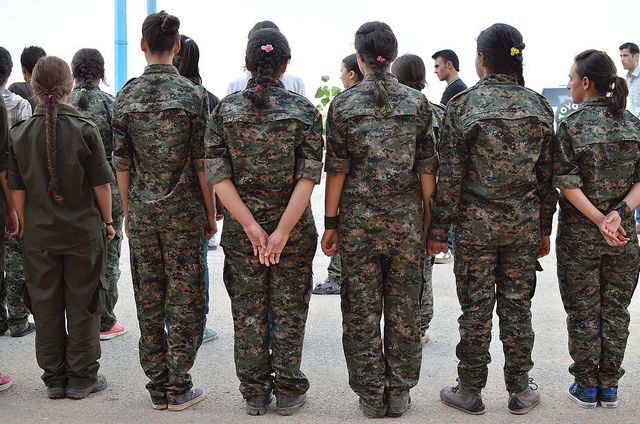
Despite Promises, The Recruitment of Children Continues in Syria
While Russia and the Syrian government promote the narrative that the Syrian conflict is winding down, fighters remain active on the ground, putting civilians, including women and children, at continued risk of harm. The fighting has also meant that the issue of child recruitment remains an ongoing concern in Syria. An annual UN report found that 961 verified instances of child recruitment occurred in Syria in 2017, an increase of 13 percent from the previous year. Ninety percent of those children served in combat roles, and more than a quarter of them were younger than 15 years old. Most of the cases occurred in Aleppo, Hama, and Idlib. The report also found that armed groups have detained and tortured children who were affiliated with other fighting factions. SJAC is calling attention to ongoing practices of recruiting minors and calls upon Russia, the United States, and Turkey, as backers of parties to the conflict, to pressure their partners to uphold international legal standards regarding the protection of children.
Recruitment of children is one of six grave violations against children defined by the United Nations. A ban on recruitment of children under the age of 15 was initially codified in Additional Protocol I and Additional Protocol II. The Convention on the Rights of the Child also included provisions banning recruitment of children under 15, and also required that States parties “shall endeavor to give priority to those who are oldest” with regard to children between the ages of 15 and 18. The Convention’s Optional Protocol bans non-state armed groups from recruiting or using children under 18 in direct hostilities. Moreover, the Rome Statute includes conscription or enlistment of children under 15 as a war crime.
The YPG, a component of the US-backed SDF, recently drew the attention of international monitoring groups when it announced in September 2018 that it had ordered an investigation into the presence of children in its ranks to prevent further recruitment of children. Yet, despite the YPG’s assurances, as least three separate cases of child recruitment have occurred since the military order was issued. Although the YPG did not kidnap the three children, they recruited them through pro-YPG narratives, often through social media so as to avoid alerting the children’s families. These stories reported in the media are consistent with SJAC’s documentation, which has found that despite fears of children being kidnapped and forced to participate in armed conflict, a majority of the minors who are members of the YPG joined “voluntarily.” The YPG promotes enlistment to its armed forces by equating it with national pride, extraordinary heroism and courage, and a chance to acquire enviable clothing and weapons. This process of indoctrination often occurs in private until the YPG recruiter convinces the minor to leave his or her family and join the ranks.
However, the YPG is not the only group guilty of child recruitment in Syria. Of the UN’s confirmed cases in 2017, 244 children were recruited by Free Syrian Army (FSA) affiliates, and 73 by government forces and pro-government militias. The US also recently sanctioned Iran for its use of Afghan children in its Islamic Revolutionary Guards Corps forces fighting in Syria. For all these groups, recruitment continues with impunity.
SJAC has previously written on the need to incorporate children into transitional justice processes in an appropriate way which takes into consideration their unique experiences in the conflict. Similarly, SJAC has called for psychosocial support services and rehabilitation programs as integral steps to ensure that children who have grown up during the conflict receive support, and this support is particularly key for children who have been members of armed groups. The US and Turkey should leverage their positions as backers of the SDF and some FSA groups, respectively, to ensure that partner forces are actively taking measures to prevent the recruitment of children, and Russia should place similar pressure on the Syrian government. Meanwhile, documentation groups should continue to collect information and interviews from families whose children have been recruited and from former child recruits, taking into consideration the unique vulnerabilities of children and ensuring that documentation does not cause additional harm to the child. This can include ensuring that both the child and the parent provide informed consent, framing the child as a victim instead of a perpetrator, and providing access to psychosocial support services for the child affected. SJAC and other documentation groups aim to better understand the methods of recruitment and the implications of recruitment in Syria on future transitional justice processes, prioritizing the protection and rehabilitation of children.
For more information or to provide feedback, please contact SJAC at [email protected] and follow us on Facebook and Twitter.